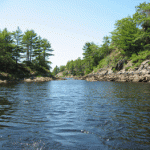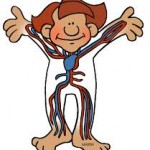I took a solo voyage of rediscovery this past week. No one else in the family was able to go canoeing, so I loaded my beloved "Chester" on the car, packed my gear, and was on the road. I bought my cedar-strip canoe in 1979 from Omer Stringer, legendary Algonquin Park guide, the same year that the Chestnut factory in Fredericton closed its doors. Omer found three of their canoes stored in a barn in Peterborough and called me: "I have found the perfect hull design for you – this is a beautiful canoe." And it was true. Omer is paddling cosmic rivers now, but Chester lives on, newly restored by Marc Russell, a former canoe student of mine running the Gull Lake Boat Works in Toronto.
 I love canoe tripping, and I especially love canoe tripping solo. This little journey was going to be balm for my soul, and I had the perfect destination – a scenic campsite off the Gibson River canoe route. My students and I had camped there every year through their junior high to secondary school graduation. My trip across the lake was idyllic – brilliant sunshine, enough of a wind to make life interesting, and a loon who surfaced off my bow and gave me the wing flap salute in what I am sure was a welcome back gesture.
I love canoe tripping, and I especially love canoe tripping solo. This little journey was going to be balm for my soul, and I had the perfect destination – a scenic campsite off the Gibson River canoe route. My students and I had camped there every year through their junior high to secondary school graduation. My trip across the lake was idyllic – brilliant sunshine, enough of a wind to make life interesting, and a loon who surfaced off my bow and gave me the wing flap salute in what I am sure was a welcome back gesture.
The campsite was as beautful as ever from a distance – still sacred in my memory. It was on pine swept point that opened up on to a channel of the lake on one side and a series of pools with water cascading down from the big chute far upstream. But as I inspected the site to set up camp I was horrified at the desecration that had taken place over the thirty years since I had last been there. The entire ground area, once walkable in bare feet, was covered in broken glass, plastic water bottle tops and bread bag closures, and bits and pieces of broken gear.
The campfire circle that we always kept small had expanded into a Viking funeral pyre and the entire area was littered with glass, can lids, partly burned food and half burned logs big enough to build a cabin. Someone had put an old rectangular metal stove beside the firepit alongside the remants of less durable stoves, BBQs and cooking grates – a kind of graveyard to bad wilderness cooking. The old stove itself was filled with empty beer and liquor bottles.
The most disturbing discovery was the amount of cigarette butts covering every inch of the campsites and trail systems, along with toilet paper clumps every few feet along the trails behind the tenting area. That, and the fact that every tree had been stripped of its branches as far as the arm could reach. Ironically, high in a tree partly covered by vegetation, was a sign posted by the Ministry of Natural Resources for the Government of Ontario proudly stating: "This Area is a Conservation Reserve – low impact, no-trace camping only". Not only could you barely see the sign, but the detailed print was so small it would have been missed by the most ethical of campers, let alone the ignorant humans who had nearly destroyed the site.
Ironically, high in a tree partly covered by vegetation, was a sign posted by the Ministry of Natural Resources for the Government of Ontario proudly stating: "This Area is a Conservation Reserve – low impact, no-trace camping only". Not only could you barely see the sign, but the detailed print was so small it would have been missed by the most ethical of campers, let alone the ignorant humans who had nearly destroyed the site.
I spent the rest of that day and the next morning cleaning up – when I left in the afternoon, it was as clean as I could get it – I loaded three full, large heavy duty garbage bags into Chester and we paddled back home. I let the ranger at the Provincial Park entrance know about the situation and she promised a year-end sweep of the area. I'm going back in the fall to check it out and post a new sign, something from a teaching my father left me: "Son, always leave your campsite cleaner than you found it."
Amen.
*****
Skid Crease, Caledon




